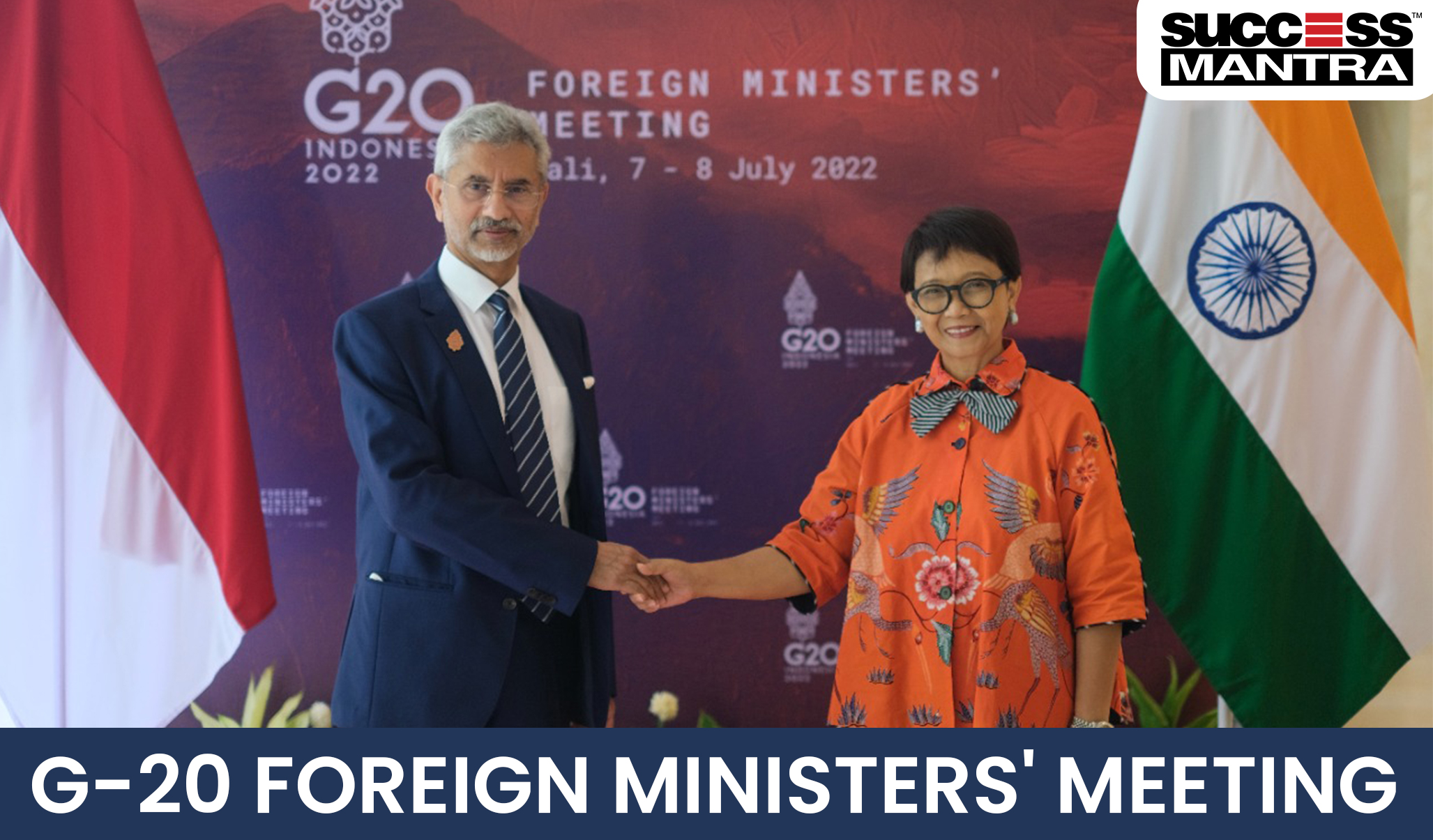
G 20 FOREIGN MINISTERS MEETING
G-20 FOREIGN MINISTERS' MEETING
Recently, the External Affairs Minister of India met with the US Secretary of State and Russian Foreign Minister and other counterparts in Bali (Indonesia) on the sidelines of the G20 Foreign Ministers Meeting. The meeting was held under the theme of “Building a more peaceful, stable, and prosperous world together.”

Current Affairs Notes By Success Mantra Coaching Institute GTB Nagar Delhi CLICK HERE
WHAT DO WE KNOW ABOUT THE RECENT G20 MEETING?
India & China: The External Affairs Minister of India met the State Councilor and Foreign Minister of China. India called for an early resolution of all the outstanding issues along the LAC in Eastern Ladakh. Recalling the disengagement achieved in some friction areas, India reiterated the need to sustain the momentum to complete disengagement from all the remaining areas to restore peace and tranquility in the border areas. Both sides affirmed that the military and diplomatic officials of the two sides should continue maintaining regular contact and looked forward to the next round of Senior Commanders’ meeting at an early date. China appreciated India’s support during its BRICS Chairmanship this year and assured China’s support for India’s upcoming G20 and SCO Presidency.
Other Areas of Discussion: The meetings indicated the emerging differences within the G20 grouping as Russia accused the United States of forcing Europe and the rest of the world to abandon cheap energy sources while the US blamed Russia for “global food insecurity”. The G20 that includes 20 of the world’s biggest economic powers has a mandate to discuss global economic matters but the Foreign Ministers Meeting in Bali was dominated by criticism of Russia by the western members. The Ukraine war and its economic fallouts are hinting at a division within the ranks of the global grouping, with the US, EU, Japan, Canada, Australia, France forming one anti-Russia block while the rest of the countries prefer a cautious approach asking for peaceful resolution of the war in Ukraine.
WHAT DO WE NEED TO KNOW ABOUT G20?
About: It is an informal group of 19 countries and the European Union (EU), founded in 1999, with representatives of the International Monetary Fund and the World Bank. Its members are Argentina, Australia, Brazil, Canada, China, France, Germany, India, Indonesia, Italy, Japan, Republic of Korea, Mexico, Russia, Saudi Arabia, South Africa, Turkey, the United Kingdom, the United States and the EU. Nigeria was meant to be the “20th” member and was dropped at the last minute due to political troubles at the time. The membership comprises a mix of the world’s largest advanced and emerging economies, representing about two-thirds of the world’s population.
Functioning of G20: The G-20 has no fixed headquarters, and the secretariat moves by rotation between the countries hosting or assuming Presidency of the grouping each year. The members are divided into five groups (India is in Group 2, along with Russia, South Africa and Turkey). The G-20 agenda that still depends heavily on the guidance of Finance Ministers and central Governors is finalised by a unique system of ‘Sherpas’, who are special envoys of G-20 leaders. Another feature of the G-20 is ‘Troika’ meetings, comprising the countries presiding over the G-20 in the past year, present year, and next year. At present, the Troika is made up of Italy, Indonesia and India.

PRAVAHINI Current Affairs Notes By Success Mantra Coaching Institute GTB Nagar Delhi CLICK HERE
HOW HAS THE G-20 EVOLVED OVER THE YEARS?
The Global Financial Crisis (2007-08) cemented G20’s reputation as the premier crisis management and coordination body. The US, which held the G20 Presidency in 2008, elevated the meeting of the Finance Ministers and Central Bank Governors to Heads of State, resulting in the first G20 Summit. The Summits in Washington DC, London, and Pittsburgh set the scene for some of the most durable global reforms: Blacklisting states in an effort to tackle tax evasion and avoidance, provisioning stricter controls on hedge funds and rating agencies, making the Financial Stability Board an effective supervisory and watchdog body for the global financial system, proposing stricter regulations for too-big-to fail banks, refraining members from imposing new barriers to trade etc. By the time Covid-19 struck, the G20 had wandered off from its original mission and G20 lost its focus. G20 reinvented itself by widening its agenda to include issues such as climate change, jobs and social security issues, inequality, agriculture, migration, corruption, terror financing, drug trafficking, food security and nutrition, disruptive technologies, and meeting the sustainable development goals. In recent times, G20 members have made all the right commitments after the pandemic, but there is little to show in action. At the Riyadh Summit in October 2020, they prioritised four things: fighting the pandemic, safeguarding the global economy, addressing international trade disruptions, and enhancing global cooperation. The Italian Presidency in 2021 had focused on three broad, interconnected pillars of action — People, Planet, Prosperity — vowing to take the lead in ensuring a swift international response to the pandemic.
INDIA'S POTENTIAL FOR THE G20 PRESIDENCY?
As a founding member of the G20, India has used the platform to raise issues of vital importance and those that impact on the most vulnerable around the world. But due to the rising toll of unemployment rates and poverty in the domestic portion, it’s hard to take the lead effectively. Concurrently, India’s leadership role in delineating the success of India-France led International Solar Alliance is globally well acclaimed as a turning point intervention in mobilising resources towards promoting research and development in renewable energy. Also, the vision of ‘Self Reliant India (Atmanirbhar Bharat)’ initiative is expected to play a transformational role for “New India” in the global paradigm as an important and reliable pillar of world economy and global supply chains in the aftermath of Covid -19 crisis. India’s endeavour of establishing the Coalition for Disaster Resilient Infrastructure, comprising nine of the G20 nations amongst others provides new dimensions of leadership in the global growth process.

TEST YOURSELF
Q.1 Which of the following countries hold the current presidency of the Group of Twenty (G-20)?
- India
- Saudi Arabia
- Indonesia: ANSWER
- None of the above-mentioned
Q.2 Out of the given options, which of the following has been recently appointed as the new Indian G20 sherpa for 2022?
- Amitabh Kant: ANSWER
- Rajiv Mehrishi
- Suman Bery
- None of the following
Q.3 India recently joined the G20 Troika. The current G20 Troika is made of which of the following three countries?
- Indonesia, India & Saudi Arabia
- Italy, Japan & Saudi Arabia
- Italy, Indonesia & India: ANSWER
- None of the above
Q.4 Which of the following statements is not correct regarding the G 20?
- The G20 summits are attended by the Finance Ministers and Central Bank Governors of the member countries only.
- India never hosted any G20 summit.
- Its main aim is to eliminate poverty from the world: ANSWER
- Its meetings are held annually.
Q.5 Consider the given statements & state which of the following is/are correct in the reference to the Group of Seven (G-7) nations?
- It is an intergovernmental organization that was formed in 1995 & meets annually to discuss issues of common interest like global economic governance, international security and energy policy.
- The Group of Seven (G-7) countries includes the United Kingdom, China, India, Germany, Italy, Japan and the US.
- Only I follows
- Only II follows
- Both I & II follows
- None of the above: ANSWER
Click Here to Read More Article on Success Mantra Blog













0 Comment